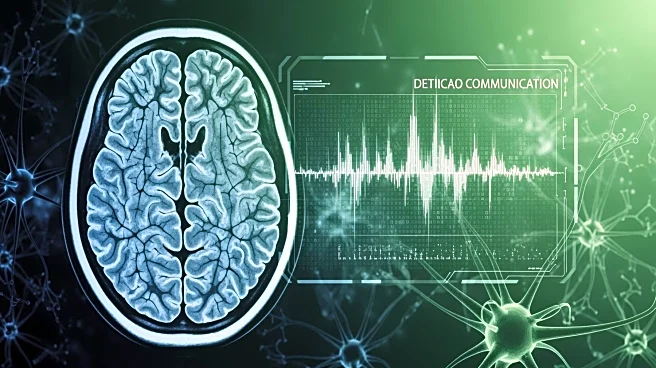What's Happening?
A new technique known as 'mind captioning' has been developed to generate descriptive sentences based on brain activity, potentially aiding individuals with language difficulties, such as those caused
by strokes. This method, detailed in a paper published in Science Advances, utilizes functional magnetic resonance imaging to read brain activity and predict what a person is seeing or picturing with remarkable accuracy. Researchers have trained AI models to analyze text captions from over 2,000 videos, creating unique numerical 'meaning signatures' that correspond to brain activity patterns. This advancement marks a significant step in understanding how the brain represents the world before thoughts are verbalized.
Why It's Important?
The development of 'mind captioning' technology holds significant implications for individuals with communication challenges, particularly those affected by strokes. By providing a means to translate brain activity into coherent sentences, this technology could enhance communication abilities and improve quality of life for many. Furthermore, the ability to decode complex brain interpretations could lead to advancements in neuroscience and AI, offering insights into brain function and potentially aiding in the development of new therapeutic approaches. The integration of AI in medical technology continues to push boundaries, promising transformative impacts on healthcare and patient support.
What's Next?
As the technology progresses, further research and development are expected to refine the accuracy and applicability of 'mind captioning'. Researchers may explore expanding the model to accommodate a broader range of brain activities and contexts, potentially leading to more comprehensive communication tools for individuals with various neurological conditions. Collaboration between neuroscientists and AI developers will be crucial in advancing this technology and ensuring its practical implementation in clinical settings. Ethical considerations regarding privacy and consent in brain activity monitoring will also need to be addressed as the technology becomes more widespread.
Beyond the Headlines
The ethical implications of brain-reading technology are profound, raising questions about privacy, consent, and the potential misuse of such capabilities. As the technology becomes more sophisticated, it will be essential to establish guidelines and regulations to protect individuals' rights and ensure responsible use. Additionally, the cultural impact of being able to 'read minds' could shift societal norms around communication and privacy, necessitating a reevaluation of personal boundaries and the definition of mental autonomy.










